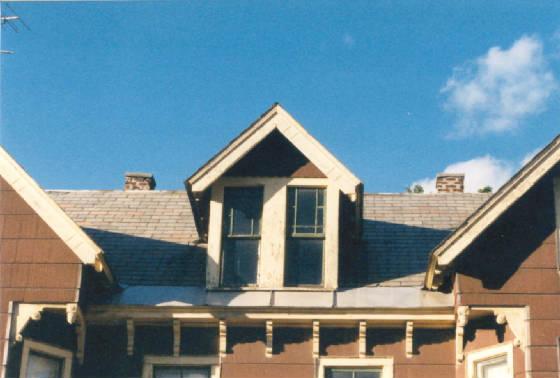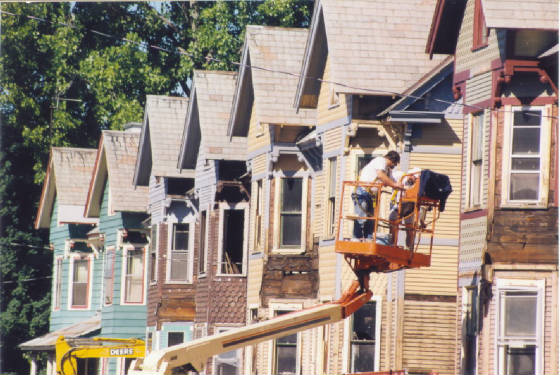
In early 1999, these Victorian mill houses, filled with the humble memories of working-class families, appeared destined for demolition. In less than a century, River Street people had witnessed the prosperous years of Arnold Print Works and its decline during the Great Depression. When Pearl Harbor was attacked, sons of River Street were carried off to war on outbound trains that disappeared into the valley. A year later, River Street people saw Arnold go out and Sprague come in.
In the early 1950s, people watched from River Street windows as the Army Corps of Engineers tore up the riverbanks and installed the flood control chutes. In 1986, all went quiet as Sprague closed. For those who still remembered the old days, the river no longer raged, the clock tower no longer rang, and the trains seldom whistled in the night.
River Street became the home of the Harvest Soup Kitchen and the Salvation Army. Front doors lay open in tenements and houses, exposing baby carriages and rusty bicycles under stairwells. Sheets of clear plastic covered windows, and young men smoked cigarettes and worked on junky cars.
Across the river, the renovation and conversion of Sprague Electric into Mass MoCA proceeded in earnest. Windows were duplicated and replaced, paint of matching colors was applied, and brick walls were restored. But on the old houses, window frames continued to rot, paint continued to peel off, and porches continued to sag.
“Some of the apartments weren’t too cool, but a lot of ‘em were in good shape.”
When plans for the Porches Inn were announced, the houses suddenly had the prospect of a new, if vastly different life. But 43-year-old Tina (Bushika) Holland was not happy about it. She was collecting disability. A single mother of two, she had lived at 241 River Street for several years. Despite the deterioration of the area, she enjoyed the comforts of a large apartment and some friendly neighbors.
“I was happy. It was a perfect location. It was close to downtown. I didn’t have a car. I was on the flat – no hills or nothin’. I had a gas stove and a space heater. We had to put plastic on some of the windows, but that’s a way of life around here. It was quiet. Once in a while, you’d get a bunch of drunks comin’ by from the bars.”
“The trouble had calmed down over the years. In the middle ‘70s, you couldn’t walk that area of River Street without a knife on you or two big guys with you. For women, it was not too cool. I had friends that lived down there, and I always called before I went, so they could watch for me and have one of the guys come up to meet me.”
“But when I was living there, everybody looked out for everybody. It was like, ‘Hey, I need enough to make a pot of coffee.’ And they’d say, ‘Sure, c’mon over and get it.’ If somebody needed something, all they had to do was pick up the phone or knock on the door. If they found out I was doing without, I basically got read the riot act. Of course, there was a few of the other kind; you know, ‘Don’t know him, don’t like the looks of him, we won’t go there.’ ”
“The landlord hired me for $5 an hour to go through everything. I worked off my security and part of my first month’s rent. They basically put me in charge of all the kids they hired. I was sort of self-taught from living in other places where the landlords didn’t want to fix things themselves. They redid walls and windows and everything.”
“Appearances are so deceiving. The outsides looked like crap, but the insides were okay. Granted, wear and tear on the floor and paint chips and stuff. But most people kept ‘em up. They had carpets. Some of the apartments weren’t too cool, but a lot of ‘em were in good shape.”
“The only thing I didn’t like was that you’d go to sit on your porch, and you’d see that damn mill. Day in and day out, that gets to be depressing. Everybody looked at me like I was an idiot, ‘cause when I first moved in, I moved my table over by the window where I could look out at that big rock. It was better than lookin’ at that mill.”
“Around Christmas 1999, I heard rumors that the landlord was selling. He showed up at the house one night, and I looked him dead in the eye and said, ‘I heard you’re selling.’ He said, ‘Nope. I ain’t sellin’, and you ain’t gotta worry about it.’ Two days later, it was in the paper that he sold it. It ended up that the landlord locked me out. He allowed me just enough time to grab enough stuff to get me by for a few days.”
“In the meantime, I got a hold of Mass MoCA and spoke to one of the higher-up guys and told him, ‘I need to get in there for the simple fact that it’s gonna be overrun with roaches and rats. I have five coolers of meat in there, plus my big freezer is half full.’ He was very nice. He got me back in, but I had to throw out everything in the coolers and the freezer. Then I found this place on Union Street. I went from six really good-size rooms and an attic to four small rooms and no storage. It’ll do till I find somethin’ else. If I could, I’d go back to River Street in a heartbeat.”
“If it wasn’t bad luck, it was no luck at all.”
Tina’s former neighbors, Rene and Annette (Dubreuil) Cote, moved to 243 River Street in 1999. Both area natives, they were married in 1984, and have three children. About eight years ago, Rene was seriously injured in a construction accident. But their troubles were just beginning.
Rene: “I was working for Associated Pipelines. We were building sand barriers next to the street. Those sand bags weigh about 80 pounds each. I got hit by one of ‘em. I came home, and the next day I went to the hospital. I had no feeling in my limbs. They put me on workman’s comp, and I’ve been drawing that ever since. I can get around okay, but I can’t do any of the work I was doin’ before. I hate it.”
Annette: “I’m a certified nurse’s aid. I was working winters at Willowood. It’s now called Williamstown Commons. But after the accident, we had to get a babysitter so I could work all year. Then our trailer on Florida Mountain burned down, and we lost our home and all of our belongings. We didn’t have any insurance. If it wasn’t bad luck, it was no luck at all.”
“We moved a few times over the next couple years, but couldn’t find anything decent until the apartment on River Street came along. It was pretty quiet there. Nobody bothered anybody. There was no fights on the streets. But we hadn’t been there two years when we heard that the landlord had sold it. Then I found out I had lung cancer. I had to have surgery, so we needed to find a new place as soon as possible. They took part of my lung out. They say they got it all. It’s been over a year, and I’m okay so far.”
Rene: “So we found this place on Veazie Street. We got everything situated before she had her surgery. It’s smaller, but it’s a lot less expensive to heat. We’re very happy here.”
“I didn’t want to move out after 32 years. I was the last of the old group.”
Willard (Bill) Mason, a 76-year-old former maintenance worker for the State of Massachusetts, moved to 231 River Street in 1968 when he got married to Dottie Francis, who lived there with her mother. Dottie walked to work every day to Cascade Paper on nearby Brown Street. Bill’s office was just up the street. Things were going well. But by the time Bill retired in 1984, life on River Street was not the same.
“It was like night and day. When I moved there in ’68, there was four apartments, and every one of those apartments had older people. By the ‘90s, most of the people we knew were gone, except for Mrs. Flaherty. The new ones had kids and pets. They were getting the rent paid by the government or somebody. Some of them were noisy, especially if they had barking dogs and cryin’ babies.”
“We used to sit out on the porch in the old days, but we weren’t doing that anymore, ‘cause the people on the other side were using half the porch anyway, and they’d make a mess. And the traffic was tremendous. About four or five o’clock at night, it was just a steady stream of cars comin’ from all over the place.”
In 1993, Dottie passed away, and things just kept going downhill. At one point, some kids got in and started a fire in the hallway. His friend John Flaherty told him, “Bill, I think they’re trying to get rid of you.” But Bill stayed.
“I was alone, and I just figured I could handle it. But then I had to leave, ‘cause the landlord sold it. I didn’t want to move out after 32 years. I was the last one after Mrs. Flaherty died. I was the last of the old group.”
Bill was able to find a small, modern apartment around the corner on Veazie Street.
“I had some memories on River Street that I don’t have here. Some people think I was goofy to stay there as long as I did, but I liked to look around the rooms and say, ‘My wife used to be here.’ I can’t say that on Veazie Street.”
“Still, it’s a lot better than where I was. It’s as close to the same location as I could get. I have no car, so I can still walk to different places like the Big Y and restaurants. I’ve got gas heat and hot water. If there’s something wrong, they’ll fix it.”
“When I moved, I took a lot of the stuff with me. I left a lot of it, too. I threw away a bunch of mementos I probably should’ve kept. But I got enough here anyway. I’m all right. It’s a little over my budget, but I can handle it.”
